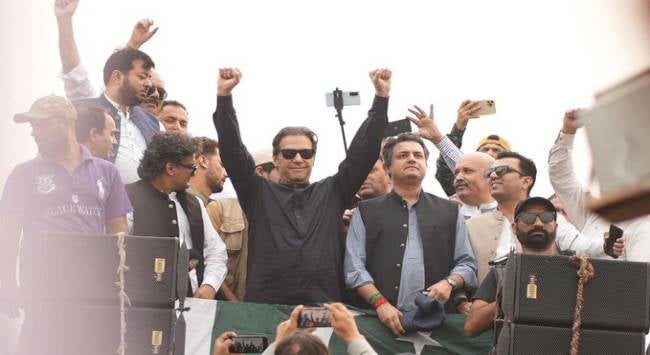Interpreting Imran Khan’s Long March:
Economy, Establishment and the Politics of Neutrality in Pakistan
Imran Ahmed
3 November 2022Summary
Pakistan’s former prime minister Imran Khan’s undertaking of a long procession to Islamabad is a strategy to push for early elections at a time when his popularity is rising, and the ruling government’s appeal is declining. But Khan requires the support of the establishment to make this a reality. He has engaged in a number of strategies to bridge the estrangement between his party and the establishment, including an onslaught against the public image of the armed forces as well as offering to appoint the next army chief.
Pakistan’s former prime minister Imran Khan gathered his supporters last week to undertake a long procession spanning some 400 kilometres from Lahore to the country’s capital in Islamabad in order to pressure the security establishment and the current coalition government, headed by Shehbaz Sharif, to call early elections. While Khan has been barred from holding public office by the country’s election commission, no ban is in place to stop him from leading his party, the Pakistan Tehreek-e-Insaf (PTI).
The week-long demonstration dubbed ‘Haqeeqi Azadi March’, or the ‘March to Real Freedom’, is expected to pass through cities sympathetic to Khan’s political campaign but meet state resistance at Islamabad, where the government plans to stop protestors from entering the city. The show of strength at the procession compounds the growing uncertainty and turmoil in Pakistan, which is still reeling from long-standing economic pressures, including the rising cost of living, social unrest and distress exacerbated by catastrophic floods, and an ongoing political crisis which saw the termination of Khan’s prime ministership six months ago through a successful vote of no-confidence.
Khan remains a polarising figure. He speaks of draining the swamp of corrupt elites, standing up to inimical Western powers and rebuilding Pakistan as a welfare state modelled on 7th century Medina. His populism frames the people against the venal career politician, Islam versus the West and virtuous good patriots battling diabolical traitors that all too often serve foreign masters. The substantive dimension of his political vision, however, remains wanting, and Khan was often derided for lacking concrete policies in matters of actual governance. His critics called him “U-turn Khan” and noted that though Khan promised much, he delivered little. And, ultimately, his authoritarian style of leadership and mismanagement of the economy and foreign policy placed him at odds with his coalition allies and the security establishment. The opposition coalition which replaced him was beset with a gargantuan task of steering Pakistan away from the complex and convoluted set of political, economic, and social crises. But Khan’s growing popularity is suggestive of discontent with the current administration.
Sharif assumed office at a time of rising interest rates, soaring inflation and a falling rupee. The country’s foreign exchange reserves were at their lowest since June 2020, and foreign debt was at 43% of the country’s GDP. The impact of the invasion of Ukraine further compounded the difficult and unpopular decisions the new administration had to make in order to steer Pakistan from the precipice of economic collapse, including the implementation of increasing fuel and energy prices in line with a deal with the International Monetary Fund. Moreover, the alliance of parties in the current ruling coalition has struggled to offer a successful counter vision of Pakistan to that of Khan’s vision grounded on Islamic nationalism, anti-Western imperialism and a focus on the middle classes. A return to ‘Purana Pakistan’ (Old Pakistan), a jibe at Khan’s vision of Naya Pakistan (New Pakistan), appears to have declining appeal.
This suggests that there is little incentive for the Sharif-led government to call new elections at a time when Khan’s popularity, as signalled by his sweeping victory in recent by-elections, held in three provinces in mid-October 2022, appears to be accelerating. This also suggests that the real target of his politics is the establishment which has vowed to be neutral and, more recently, apolitical. The establishment is seen as the ‘king-maker’ in Pakistan. It had propped the PTI into power in 2018 but Khan’s performance saw the establishment distance itself, culminating in the ouster of his government. Khan, however, has been seeking to undo this estrangement. He maintains that the political struggle in Pakistan is a fight between good and evil, where he represents the good and his opponents – evil. He argues that the security establishment should side with him, and Khan has frequently castigated them for their political stance to be ‘neutral’. In an unprecedented press conference, the head of the Inter-Services Intelligence, Lieutenant General Nadeem Ahmed Anjum, addressed the media alongside Inter-Services Public Relations DG Lieutenant General Babar Iftikhar to defend the establishment against Khan’s allegations that the Chief of Army Staff, General Qamar Javed Bajwa, was a traitor. Anjum further maintained that Khan had offered Bajwa a lucrative offer to secure his survival as prime minister.
With Bajwa set to retire on 29 November 2022, Khan is aware that he needs the support and favour of the establishment to secure timely elections favourable to his political fortunes. His offer to work with the Shehbaz government to appoint the next army chief was flatly refused. His long march was a strategy to place pressure on the establishment to win concessions.
. . . . .
Dr Imran Ahmed is a Visiting Research Fellow at the Institute of South Asian Studies (ISAS), an autonomous research institute at the National University of Singapore (NUS). He can be contacted at iahmed@nus.edu.sg. The author bears full responsibility for the facts cited and opinions expressed in this paper.
Pic Credit: PTI’s Twitter Account
-
 More From :
More From :
-
 Tags :
Tags :
-
 Download PDF
Download PDF



